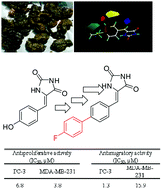Marine natural products-inspired phenylmethylene hydantoins with potent in vitro and in vivo antitumor activities via suppression of Brk and FAK signaling†
Abstract
Breast and prostate cancers are among the most common cancers worldwide with devastating statistics for the metastatic, chemotherapy- and radiotherapy-resistant phenotypes. Novel therapies interfering with new and/or multiple pathways involved in the pathology of cancer are urgently needed. Preliminary results showed that the marine natural product Z-4-hydroxyphenylmethylene hydantoin (PMH, 1) and its 4-ethylthio-analog (SEth, 2) promoted tight junction formation and showed anti-invasive and anti-migratory activities in vitro against metastatic prostate cancer cells and inhibited tumor growth and micrometastases in distant organs in orthotopic and transgenic mice models. This study focuses on the design and synthesis of second-generation PMHs with enhanced antitumor activities. A series of substituted benzaldehydes was selected based on earlier SAR studies and reacted with hydantoin to yield 11 new compounds 3–13. Compounds were evaluated for their antiproliferative, antimigratory and anti-invasive properties in vitro against the human mammary and prostate cancer cell lines MDA-MB-231 and PC-3, respectively. A Western blot analysis of the most active analog 7 showed its ability to suppress the expression of the total levels of c-Met and FAK, with subsequent reduction of their phosphorylated (activated) levels in MDA-MB-231 cells. In addition, 7 also inhibited Brk, paxillin and Rac1 phosphorylation. 7 was formulated using hydroxypropyl β-cyclodextrin (HPCD) to improve its solubility and was further evaluated in a nude mice xenograft model using MDA-MB-231/GFP cells. PMH 7 reduced breast tumor growth and suppressed Ki-67, CD31, p-Brk and p-FAK expression in tumor samples. Thus, 7 is a potential lead for the control of invasive breast malignancies.


 Please wait while we load your content...
Please wait while we load your content...